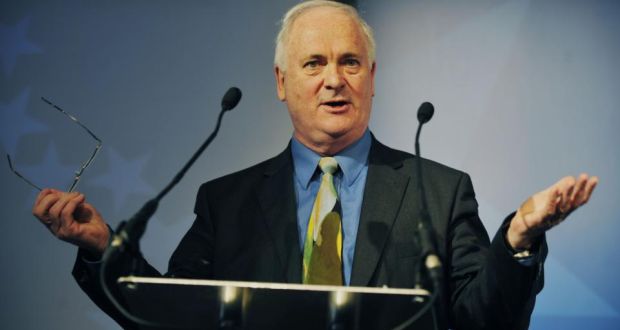Brexit is a tragedy that will see all EU member states forced to dig up the past, rather than build the future, the former Taoiseach John Bruton has told the Henry Grattan lecture in London this evening, an annual lecture organised by Trinity’s School of Social Sciences and Philosophy.
Bruton, who was taoiseach during a significant period in Ireland’s relationship with the EU, presiding over the country’s Presidency of the EU in 1996, warned that “it would be naive to think that the divorce between the UK, and the other EU countries, including Ireland, will not leave scars”.
“I hope that is all they will be, scars”, he said, “that will gradually become less visible”.
Delivered at the Irish Embassy in London this evening, Bruton discussed the challenges facing Ireland and Europe as Britain prepares to leave the EU. The Ambassador of Ireland to Britain, Daniel Mulhall, opened proceedings, while Trinity’s Professor in Political Science, Gail McElroy, chaired the talk, which comes just days after a British general election that delivered a confused and conflicted result just days before negotiations are due to begin with the EU.
“Brexit may be an exclusively British initiative, for which Britain is wholly responsible, but its effects will be felt by others”, Bruton said. There are concerns that Ireland, in particular, will be strongly affected by the form of the UK’s exit from the EU and whether the British government pursues a “soft” or a “hard” Brexit.
Organised by Trinity’s School of Social Sciences and Philosophy, the annual London lecture, which in the past has heard from former President of the European Parliament Pat Cox and EU Ambassador to the United States, David O’Sullivan, often addresses some of the biggest issues facing global politics. This year’s talk comes as Britain prepares to undertake its exit from the EU following its referendum in June 2016.
Bruton’s talk covered a range of topics, from Ireland’s role in the negotiations with the UK to the need for agreement to be reached on fisheries policy and the status of Northern Ireland, an area that has attracted considerable interest in recent days following the Democratic Unionist Party’s (DUP) decision to enter a confidence and supply agreement with the Conservative Party in the UK.
The future of power sharing in Northern Ireland, and its relationship with the UK and Ireland post-Brexit, dominated much of his speech, with Bruton critical of Sinn Féin and the DUP’s desire to agitate over “irreconcilable demands on territorial sovereignty” rather than “engaging in the day to day drudgery of Ministerial responsibility in a power-sharing administration”.
“As Brexit will absorb so much of everyone’s time in coming years, the scope for this sort of high profile counselling will be less”, he added.
Praising the “remarkable achievement” of the single market, Bruton said the combination of EU membership for the UK and Ireland, alongside the Good Friday Agreement, reduced the sense of separation between both parts of Ireland, and between each part of Ireland and the island of Britain”.
Bruton discussed last week’s general election, which confounded expectations, producing an indeterminate parliament and a weakened government, rather than the majority for the Conservatives predicted by many polls in the weeks leading up the vote. Bruton questioned the fact that Brexit was barely discussed in the general election, calling for a debate on the nuances of the upcoming negotiations. “Now that the UK General Election has failed to endorse the Prime Minister’s vision of a hard Brexit, the parties who will be forming or supporting a new government here have the opportunity to reopen some of the question like the Customs Union and acceptance of ECJ [European Court of Justice] jurisdiction in certain areas”, he said.
The agreement reached in the timespan set out by the EU will just be the beginning, Bruton warned. “An equally daunting task will come afterwards, when one has to update, interpret and ensure adequate enforcement of the initial agreement”, he said. “Everything will be up for grabs each time. Bureaucracies will have never ending occasions to justify their separate existence. But that is the path the UK has chosen.”







